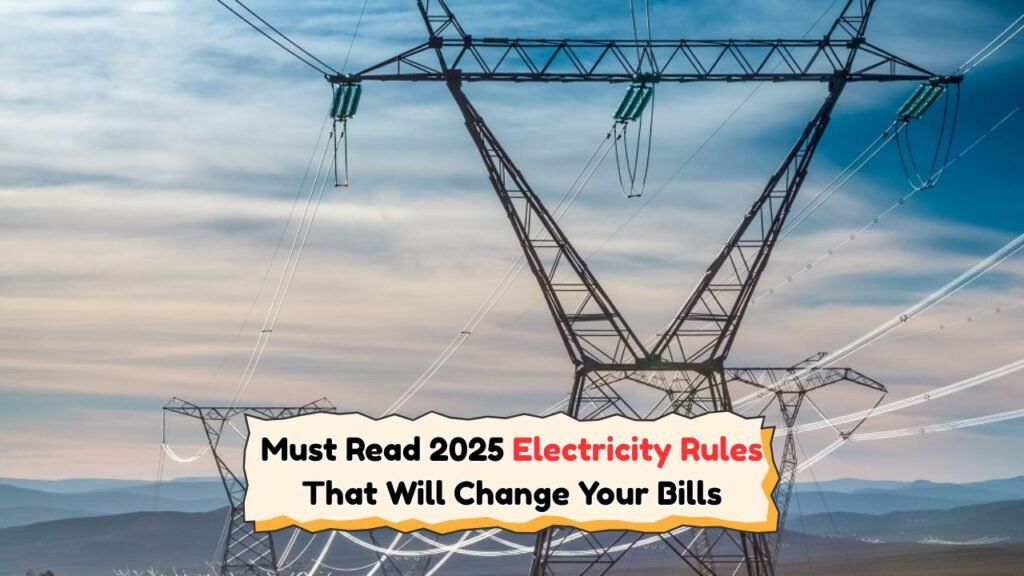2025 Electricity Law Changes Impact: As South Africa gears up for significant shifts in its energy sector, the 2025 Electricity Law changes promise to bring transformative effects on consumers across the nation. These legislative adjustments aim to address long-standing issues within the electricity supply industry, focusing on sustainability, affordability, and reliability. For South Africans, these changes could mean more competitive pricing and increased access to renewable energy sources. The upcoming reforms are expected to reshape how electricity is generated, distributed, and consumed, reflecting a broader global trend towards greener and more efficient energy solutions.

Understanding the Key Changes in the 2025 Electricity Law
The 2025 amendments to South Africa’s electricity laws introduce a host of new regulations designed to optimize the energy sector. One of the primary changes involves the liberalization of the electricity market, allowing for increased competition among energy providers. This is expected to drive down prices and enhance service quality, much to the benefit of consumers. Another significant change is the push towards renewable energy integration. The law mandates a certain percentage of energy generation from renewable sources, aligning with global environmental goals and reducing reliance on fossil fuels.
Furthermore, the new legislation emphasizes the importance of grid modernization. By investing in advanced technologies, the government aims to create a more resilient and efficient electricity distribution network. This is crucial for minimizing power outages and ensuring stable electricity delivery to all regions, including underserved rural areas. Additionally, the law introduces stricter regulations on energy consumption and efficiency, encouraging both industries and households to adopt energy-saving practices. These comprehensive changes reflect a commitment to creating a sustainable energy future for South Africa.
Impact on Electricity Prices and Consumer Costs
With the 2025 Electricity Law changes, consumers can anticipate significant shifts in electricity pricing structures. The introduction of a competitive market environment will likely lead to a decrease in electricity tariffs as multiple providers vie for market share. This competition is expected to incentivize companies to offer more attractive pricing packages and efficient services, ultimately benefiting consumers who have long grappled with high electricity costs.
The shift towards renewable energy sources, while initially requiring substantial investment, promises long-term savings. As the cost of renewable technologies continues to decrease, consumers will benefit from lower production costs being passed on to them. Additionally, the modernization of the electricity grid is expected to reduce operational inefficiencies and distribution losses, which should further contribute to cost savings.
However, there may be transitional costs associated with implementing these changes. Consumers might experience short-term price increases as infrastructure upgrades and new technologies are integrated into the system. Nonetheless, these costs are anticipated to stabilize over time, leading to a more affordable and sustainable energy landscape in South Africa.
Environmental Benefits of the 2025 Electricity Law Changes
The environmental implications of the 2025 Electricity Law changes are profound, aligning with global imperatives to combat climate change. By mandating a shift towards renewable energy sources, the law aims to significantly reduce South Africa’s carbon footprint. This transition not only aids in fulfilling international environmental commitments but also enhances local air quality by decreasing emissions from coal and other fossil fuels.
Furthermore, the focus on energy efficiency and conservation will encourage both consumers and industries to optimize their energy usage. This is expected to result in a substantial reduction in overall energy consumption, minimizing environmental impact. The law also promotes the development of green technologies and sustainable practices, fostering innovation within the energy sector.
These environmental benefits are anticipated to have ripple effects across the economy, promoting job creation in the renewable energy sector and contributing to a healthier ecosystem. In the long run, these changes represent a crucial step towards achieving a sustainable and resilient energy system in South Africa.
Adapting to the New Electricity Legislation
As South Africa prepares for the implementation of the 2025 Electricity Law changes, consumers and businesses alike must adapt to the evolving energy landscape. Education and awareness will play a critical role in this transition. Consumers need to understand the benefits and opportunities presented by the new legislation, including potential cost savings and environmental improvements.
Businesses, especially those in energy-intensive industries, must explore strategies to enhance energy efficiency and integrate renewable energy sources into their operations. Government incentives and support programs will be crucial in facilitating this shift, ensuring that the transition is both smooth and economically viable.
The implementation of these changes will require a collaborative effort between government entities, energy providers, and consumers. Stakeholders must work together to address challenges and leverage opportunities presented by the new legislation. By embracing these changes, South Africa can pave the way for a sustainable energy future that benefits both the economy and the environment.


